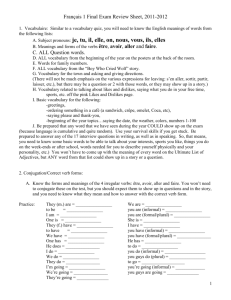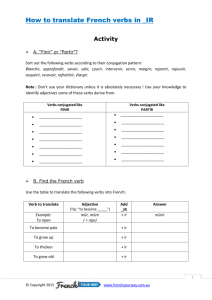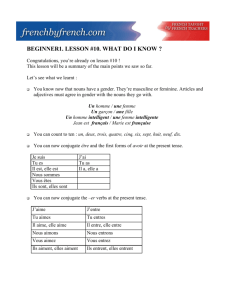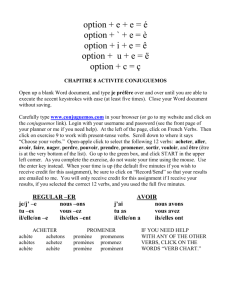Here
advertisement
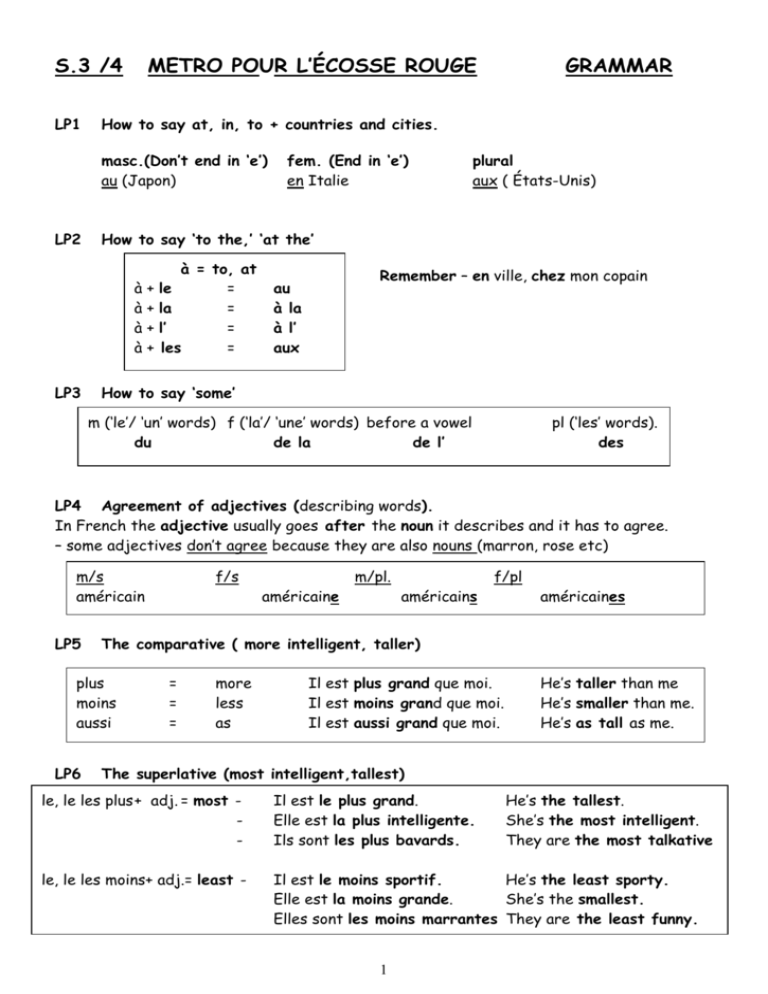
S.3 /4 LP1 METRO POUR L’ÉCOSSE ROUGE How to say at, in, to + countries and cities. masc.(Don’t end in ‘e’) au (Japon) LP2 m/s fem. (End in ‘e’) en Italie plural aux ( États-Unis) How to say ‘to the,’ ‘at the’ à = to, at à + le = à + la = à + l’ = à + les = LP3 GRAMMAR Remember – en ville, chez mon copain au à la à l’ aux How to say ‘some’ m (‘le’/ ‘un’ words) f (‘la’/ ‘une’ words) before a vowel du de la de l’ pl (‘les’ words). des LP4 Agreement of adjectives (describing words). In French the adjective usually goes after the noun it describes and it has to agree. – some adjectives don’t agree because they are also nouns (marron, rose etc) m/s américain LP5 américaine m/pl. américains f/pl américaines The comparative ( more intelligent, taller) plus moins aussi LP6 f/s = = = more less as Il est plus grand que moi. Il est moins grand que moi. Il est aussi grand que moi. He’s taller than me He’s smaller than me. He’s as tall as me. The superlative (most intelligent,tallest) le, le les plus + adj. = most - Il est le plus grand. Elle est la plus intelligente. Ils sont les plus bavards. le, le les moins+ adj.= least - Il est le moins sportif. He’s the least sporty. Elle est la moins grande. She’s the smallest. Elles sont les moins marrantes They are the least funny. 1 He’s the tallest. She’s the most intelligent. They are the most talkative LP7 How to form the Present tense of ‘er’, ‘ir’, ‘re’ verbs 1 Take off the er, re,ir 2 add endings je er e es e ons ez ent(shh!)) je tu il, elle, on nous vous ils/elles re s s ons ez ent(shh!) ir is is it issons issez issent Remember – in negative sentences the ne... pas goes round the verb e.g. Je ne joue pas au foot. LP8 Reflexive verbs You already know a reflexive verb – je m’appelle literally means I call myself. Reflexive verbs simply require an extra pronoun. e.g. se laver - to wash oneself, to get washed je me lave tu te laves il,elle, on se lave I get washed do you get washed he,she, we gets washed nous nous lavons vous vous lavez ils,elles se lavent we get washed do you get washed they get washed – in negative sentences the ne...pas goes round the reflexive pronoun and the verb e.g. Je ne me douche pas. I don’t shower. LP9 Direct object pronouns. How to say him. Her, it, them Remember e.g. But him, it her,it them le/ l’ la/ l’ les - in French the direct object pronoun goes before the verb. Je le préfère. Je l’aime. – - I prefer him,it. I like him,her,it 2 LP10 How to say what you are going to do. use aller ( see irregular verbs at end of sheet) in the present tense and add an infinitive ( jouer, faire etc.) e.g. Je vais voir La guerre des Étoiles. I’m going to see Star Wars. LP11 Possessive adjectives my your(‘tu’) his her our (‘on’) our (‘nous’) your (‘vous’) their m/s f/s pl. mon ton son son son notre votre leur ma ta sa sa sa notre votre leur mes tes ses ses ses nos vos leurs LP12 How to say you like / don’t like doing something aimer - to like Negative = + Je infinitive( to play etc.) n’aime pas sortir – I don’t like going out. LP13 Talking about the past See sheets on the Perfect and Imperfect tenses at the end of the booklet. LP14 Talking about the future See sheet on the Future tense at the end of the booklet. LP15 How to say ‘would’ See sheet on the Conditional tense at the end of the booklet. 3 Present Tense Irregular Verbs Irregular verbs do not follow a pattern and have to be learned off by heart. Avoir (to have) et être (to be) are the two most-used verbs in French. avoir j’ai tu as il a I have nous avons we have do you have? vous avez do you have? he has ils ont they have Remember that the French also use avoir when talking about age. e.g. j’ai 15 ans être je suis tu es il est 7 to have to be I am are you? he is nous sommes vous êtes ils sont aller je vais tu vas il va je fais tu fais il fait nous allons vous allez ils vont nous faisons vous faites ils font I can can you? he can je veux tu veux? il veut I can can you? he can we do do you do? they do to be able, can nous pouvons vous pouvez? ils peuvent vouloir we go do you go? they go to do, make I do, make do you do? he does pouvoir je peux tu peux? il peut to go I go do you go? he goes faire we are are you? they are we can can you? they can to want nous voulons vous voulez? ils veulent 4 we can can you? they can The Perfect Tense Part one The Perfect Tense is used to talk about what you have done or what has happened. In English we have three ways of expressing the perfect tense but in French there is only one. e.g. I watched, I have watched, I did watch = j’ai regardé To form the perfect tense you need: a) the auxiliary – most verbs take avoir avoir j’ai tu as il a elle a on a b) to have I have do you have? he has she has we have nous avons vous avez ils ont elles ont we have do you have? they have they have the past participle verbs ending in er – take off er – add é e.g. regarder (to watch) regardé (watched) verbs ending in re – take off the re – add u e.g attendre (to wait for) changes to attendu (waited for) verbs ending in ir – take off ir – add i e.g finir (to finish) changes to fini (finished) Take the appropriate part of avoir, add the past participle of the verb you need. j’ai regardé tu as attendu il a fini nous avons parlé vous avez vendu ils ont choisi – - I watched, have watched did you wait he finished, has finished we spoke, have spoken you sold, have sold they chose, have chosen Remember – in a negative sentence the ne...pas goes round the auxiliary. e.g je n’ai pas fini – I haven’t finished 5 The Perfect Tense Part two Some past participle are irregular and have to be learned off by heart. ending in u infinitive meaning past participle meaning avoir boire devoir lire recevoir voir to to to to to to have drink have to, must read receive, get see eu bu dû lu reçu vu had drank had to read received, got saw to to to to take learn understand put(on), place pris appris compris mis took learned understood put, placed ending in s prendre apprendre comprendre mettre ending in t faire dire écrire to do,make to say, tell to write fait dit écrit did,made said, told wrote être to be été been 6 The Perfect Tense Part three A small group of verbs and all reflexive verbs take être as their auxiliary. a) the auxiliary être je suis tu es il est elle est on est I am are you? he is she is we are nous sommes vous êtes ils sont elles sont we are are you? they are they are b) The past participle has to agree with the person doing the action of the verb. Here is a rhyme to help you remember which verbs take être. Entré, rentré, arrivé resté, monté, né, allé tombé, mort, retourné These with ease we all can say. Parti sorti, descendu, revenu and devenu, venu too with these we take, and all with être conjugate aller arriver entrer monter rester naître to to to to to to go arrive, happen go in go up stay be born je suis allé(e) tu es venu il est arrivé elle est partie on est sorti nous sommes entré(e)s vous êtes né(e)(s) ils sont morts elles sont restées venir partir sortir descendre tomber mourir I went, have been did you come he arrived she left we went out we went in were you born they died they stayed 7 to to to to to to come leave go out go down fall die
